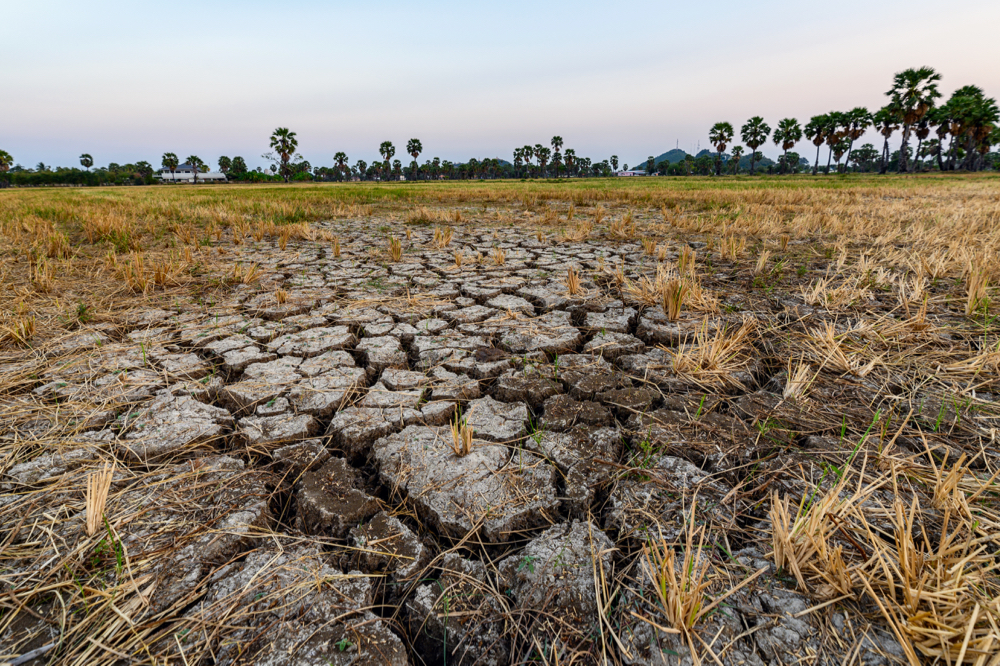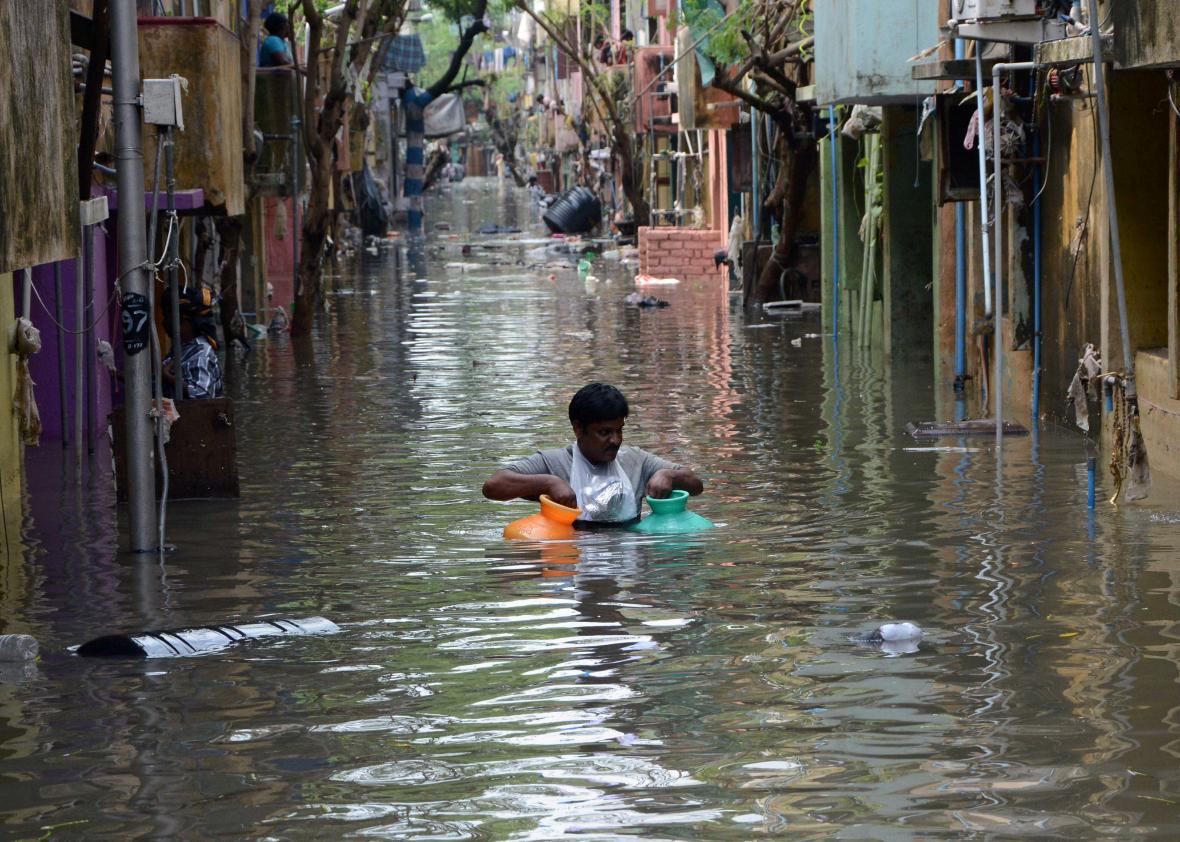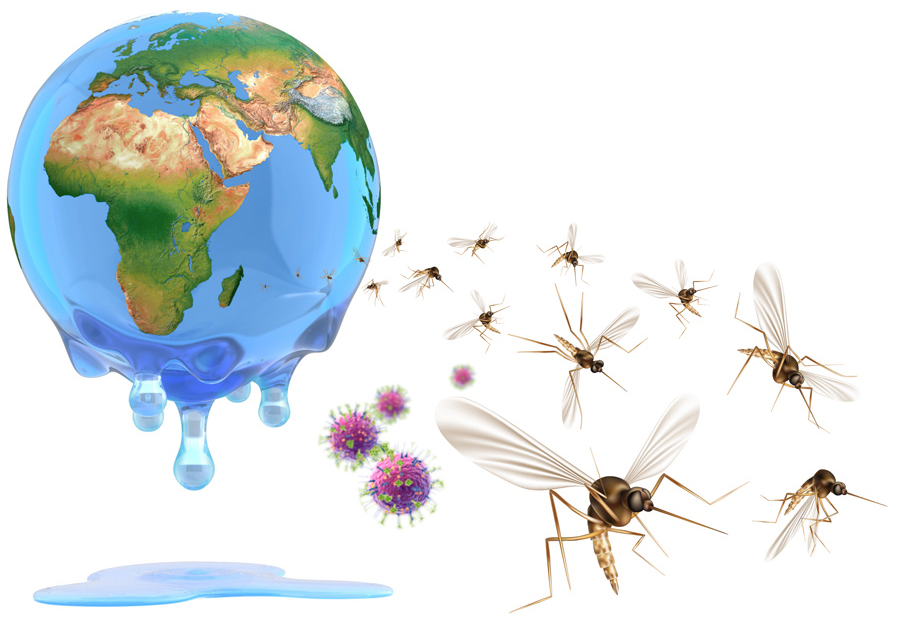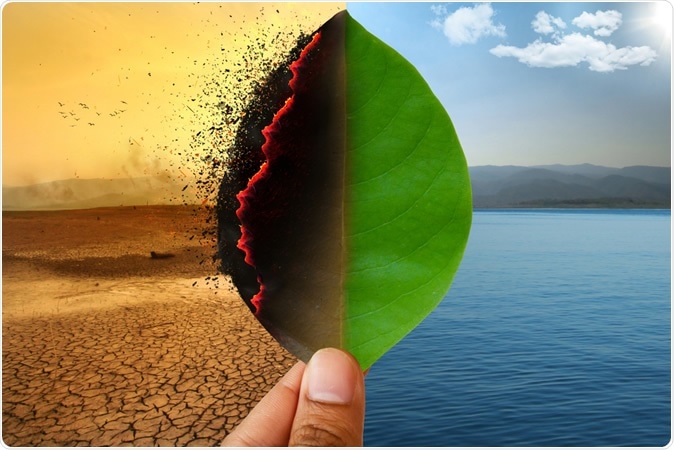Context Project
The Correlation Between Climate Change and Human Health

Human society and technology are constantly developing at a surprising pace, from which we have reaped untold benefits. At the same time, however, human beings are rapidly depleting resources from the earth, causing serious problems like decline of species diversity, environmental pollution, and global warming. Climate change is especially a worrying one. An incontrovertible truth is, the ultimate consequences of all these issues will eventually fall on ourselves. In fact, we have already paid off loans to nature, and in the decades or centuries to come, human health may suffer even more severely ordeals.
Climate Change Brings Massive Detriment to Human Health
Climate change brings diversified influences, and they can be harmful and even destructive in most cases. Environmental issues are getting more serious each year; those related problems are becoming more worrying as the problem worsens. More importantly, human health has shown to be vigilantly harmed in various ways, including food security, natural disasters, and diseases, because of the depletion of earth’s resources. This is no doubt a terrifying fact that, if climate change continues to deteriorate without preventive measures, human health is likely to fall to a rocket bottom.
Food

The quality and productivity of food directly affect human health. The process of food production is much more sophisticated than most people expected. Planting is the primary thing in producing food, which involves watering and fertilizing. The follow-up work includes pest control, harvesting, drying, storage, and processing. Climate change seriously affects the growth of crops that further causes two main problems: food shortage and food insecurity. Famine, increased mortality and increased prevalence of various related diseases will then be elicited.
The most direct effects climate change has on food production are changes in temperature and rainfall. Due to dramatic temperature changes, the duration of growing seasons is impacted, thus changing the natural growth environment of crops and decreasing the total production. For example, rising temperatures shorten the growing season of plants, resulting in loss of food production and increased reliance on local people to buy food, further driving up food prices and ultimately increasing poverty and decreasing health insurance (Gregory 2005). Influenced rainfall, on the other hand, can lead to natural disasters like droughts or floods, which greatly reduce the survival rate of crops. This indicates a serious consequence that the affected areas are no longer able to grow certain plants; the public health, therefore, will be significantly decreased in starvation due to low production.
As pointed out by P.J.Gregory in his article, “Food systems encompass food availability, food access and food utilization, so that food security is, therefore, diminished when food systems are stressed.” Humans cannot survive without food, and climate change is one major factor that threatens it greatly.
Natural Hazards

Over the past few decades, one of the largest threats to human health has been natural disasters. Hurricanes, heat waves, torrential rains, and wildfires kill countless numbers of people each year. The more terrifying thing is, every country and region will suffer completely diversified natural disasters due to differences in condition and environment. This fact brings a lot of inconvenience to climate change prevention and management, that is, unified solutions are not feasible. Generally, the root cause of natural disasters is that long-term climate change seriously damages the local ecosystem, causing deaths and economic losses, thus lowering the health of all humans.
Take Iran as an example. According to the data, “one hundred and three natural disasters happened between 1900 and 2012 in Iran, with a total of 155,878 deaths. Iran’s natural disasters risk class has been estimated as 8 out of 10, and the trend of its natural disasters has been increasing in recent years (Mousavi 2019).” These worrying numbers are all emphasizing the seriousness of climate change. Short-term climate change, especially extreme abnormal weather phenomena, such as hail, and sandstorms, are often more serious natural disasters, enough to cause a devastating blow to human society. Except for damages to human health, long-term climate change, even if relatively slow, will also bring about essential changes in the ecosystem and completely change the layout and mode of production, thus affecting the economic life of human society.
In another report, Robin Xu and his colleagues focused on a specific natural disaster, wildfires. They pointed out that rainfall anomalies associated with climate change can exacerbate droughts in the tropics. Rainfall then becomes more concentrated in winter, which makes other seasons, especially summer, hotter and drier, provoking the chances of wildfires. He further concluded that “wildfires are associated with increased morbidity and mortality, but there are many gaps in knowledge regarding their health effects. At the individual level, people can do little to reduce the adverse health consequences of exposure to wildfires”. In other words, life becomes so vulnerable in the face of natural disasters, the correct prevention and the union of various departments can better solve the problem.

Adapted from Sun et al.6 Shown is the projected change from 1981–2000 to 2080–2099 in the frequency of wildfires (days with wildfire events per year) and the length of the wildfire season (days with a normalized daily fire danger index value above a threshold of 50 per year) with an increase in the global mean surface temperature of 1.5°C (Panels A and B, respectively) and with an increase of 2.0°C (Panels C and D, respectively) relative to the preindustrial level.
Spread of Diseases

Lorena Pasquini emphasizes in her research that water quality problems caused by climate change are inextricably linked to heat sensitivity. Adequate drinking water is essential for effective thermoregulation, and if water is not available or of poor quality, people may be extremely sensitive to the risk of dehydration, heat-related diseases, and water-borne diseases. Another research authored by Paul R. Epstein illustrated how climate change influences the biological system and thus promotes the spread of diseases. Infectious diseases are mostly spread by insects or animals, and changes in the duration of the seasons caused by global warming affect the habitat and reproduction of insects, especially mosquitoes. As seasonal variations in different regions became more pronounced, the disease spread more widely.
Africa is a very representative example in showing the seriousness of climate change-caused diseases. “One health sector respondent noted that she believed low-income residents in Dar to be most vulnerable to non-communicable diseases, while two others mentioned that low-income residents are those most vulnerable to malaria (Pasquini 2020).” This can be explained from two perspectives: environment and economic conditions. In poverty areas, people tend to pay less attention to both public and personal hygiene, allowing pests such as mosquitoes and flies to come into more frequent contact with the locals. This greatly increases the risk of people contracting infectious diseases. On the other hand, people living in poverty do not have enough money for treatments; in poor cities, medical institutions and technology are also very scarce. In the lack of treating and economic conditions, morbidity and mortality are hence increased as a result.
The spread of disease caused by climate change is a serious problem. If a more deadly infectious disease spreads among humans, as with COVID-19 recently, extinction is a foregone conclusion.
Conclusion
The consequences brought by climate change are far more dangerous than we thought. In addition to the three factors analyzed in previous sections, the health of newborns is also negatively affected by climate change. According to the article Catastrophic Effects of Climate Change on Children’s Health Start Before Birth, the records show that because of the natural hazards, families are so traumatized that they are unable to provide basic emotional and physical needs for their offspring. In addition, the death rate of children has boosted rapidly also due to the increasing number of natural disasters happening each year. Reduction of children’s health directly associated with human health, it is, therefore, crucial for governments to put more effort into resolving the issue.
Preventing and alleviating the consequences caused by climate change cannot be solved by a single government or department; it is also important to construct different prevention strategies based on different regions. It is important to understand that, by depleting the Earth's resources and species diversity, human beings are, at the same time, putting themselves at risk.

Works Cited
Epstein, Paul R. “Climate Change and Emerging Infectious Diseases.” Microbes and Infection, Elsevier Masson, 7 Aug. 2001, https://doi.org/10.1016/S1286-4579(01)01429-0Links to an external site.
Martens, P. (1999, December). How will climate change affect human health? - JSTOR. JSTOR. Retrieved November 2, 2021, from https://www.jstor.org/stable/27857937.
Mousavi, Arefeh, et al. “Climate Change and Health in Iran: A Narrative Review.” Journal of Environmental Health Science and Engineering, Springer International Publishing, 2 Apr. 2020, https://doi.org/10.1007/s40201-020-00462-3Links to an external site.
Pacheco, Susan E. “Catastrophic Effects of Climate Change on Children's Health Start before Birth.” The Journal of Clinical Investigation, American Society for Clinical Investigation, 3 Feb. 2020, https://www.jci.org/articles/view/135005Links to an external site..
Pasquini, Lorena, et al. “Emerging Climate Change-Related Public Health Challenges in Africa: A Case Study of the Heat-Health Vulnerability of Informal Settlement Residents in Dar Es Salaam, Tanzania.” Science of The Total Environment, Elsevier, 29 July 2020, https://doi.org/10.1016/j.scitotenv.2020.141355Links to an external site.
P.J, Gregory, et al. “Climate Change and Food Security.” Philosophical Transactions of the Royal Society B: Biological Sciences, 24 Oct. 2005, https://doi.org/10.1098/rstb.2005.1745
Schramm, P.J., Ahmed, M., Siegel, H. et al. Climate Change and Health: Local Solutions to Local Challenges. Curr Envir Health Rpt 7, 363–370 (2020). https://doi.org/10.1007/s40572-020-00294-1Links to an external site.
Xu, Rongbin, et al. “Wildfires, Global Climate Change, and Human Health: Nejm.” New England Journal of Medicine, 4 Nov. 1970, DOI: 10.1056/NEJMsr2028985
 icons at the top right corner of the subsection.
icons at the top right corner of the subsection.